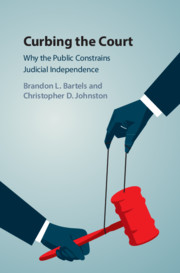Book contents
- Curbing the Court
- Curbing the Court
- Copyright page
- Dedication
- Contents
- Figures
- Tables
- Acknowledgments
- 1 The Guardians of Judicial Independence
- 2 Theories of Public Support for Court-Curbing
- 3 A Deep Dive into Supreme Court Evaluation and Support
- 4 General Policy Disagreement and Broadly Targeted Court-Curbing
- 5 Specific Policy Disagreement and Support for Court-Curbing
- 6 Partisan Polarization and Support for Court-Curbing
- 7 Procedural Perceptions and Motivated Reasoning
- 8 Reconsidering the Public Foundations of Judicial Independence
- References
- Index
6 - Partisan Polarization and Support for Court-Curbing
Published online by Cambridge University Press: 14 August 2020
- Curbing the Court
- Curbing the Court
- Copyright page
- Dedication
- Contents
- Figures
- Tables
- Acknowledgments
- 1 The Guardians of Judicial Independence
- 2 Theories of Public Support for Court-Curbing
- 3 A Deep Dive into Supreme Court Evaluation and Support
- 4 General Policy Disagreement and Broadly Targeted Court-Curbing
- 5 Specific Policy Disagreement and Support for Court-Curbing
- 6 Partisan Polarization and Support for Court-Curbing
- 7 Procedural Perceptions and Motivated Reasoning
- 8 Reconsidering the Public Foundations of Judicial Independence
- References
- Index
Summary
Chapter 6 examines how partisan polarization reduces citizens’ willingness to defend the Supreme Court from curbing attacks. The chapter focuses on two national survey experiments which randomly assign respondents to polarized or unpolarized conditions in the context of a salient Supreme Court ruling. While disagreement with Court decisions always increases support for curbing the Court, the effect of disagreement is substantially larger in polarized relative to unpolarized conditions. The chapter demonstrates that the polarization effect is not due to mere partisan branding and that disagreement with specific decisions has a larger impact on support for narrow than broad curbing.
Keywords
- Type
- Chapter
- Information
- Curbing the CourtWhy the Public Constrains Judicial Independence, pp. 175 - 214Publisher: Cambridge University PressPrint publication year: 2020

